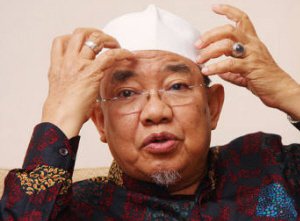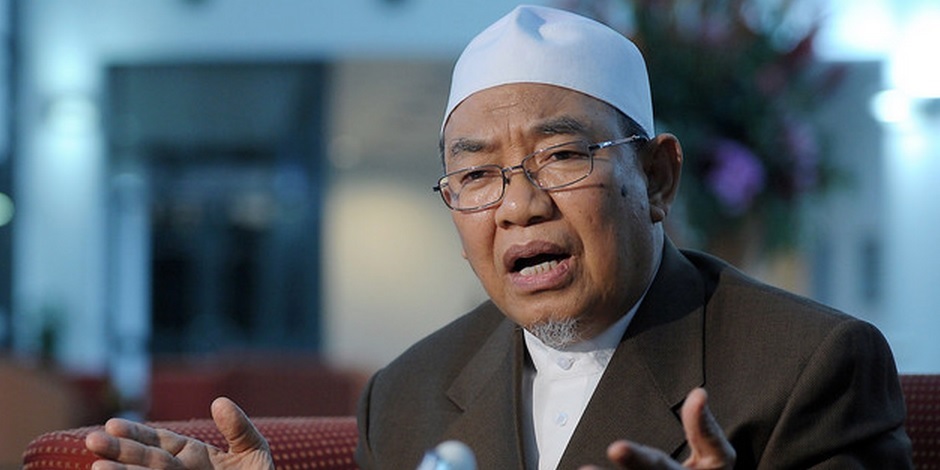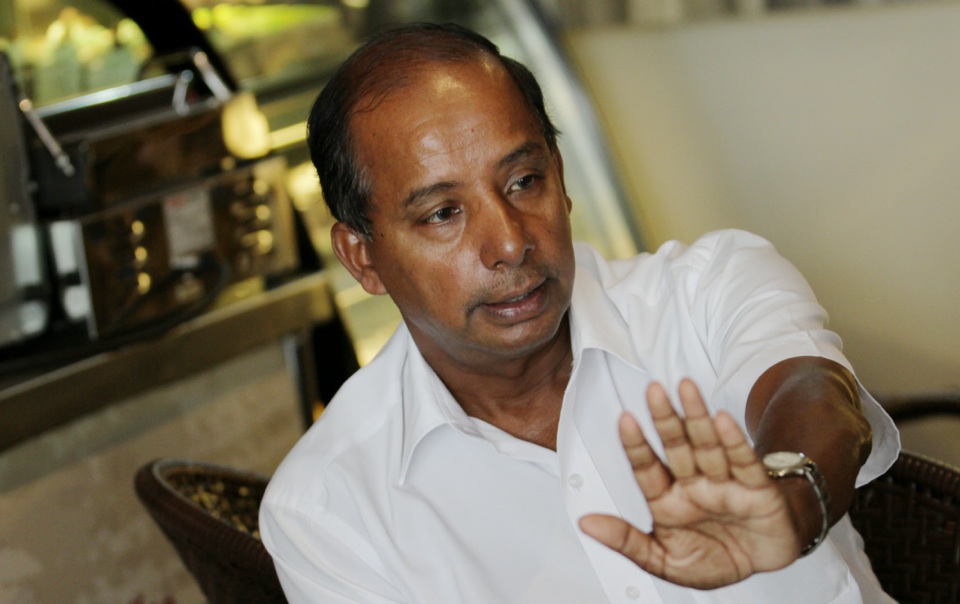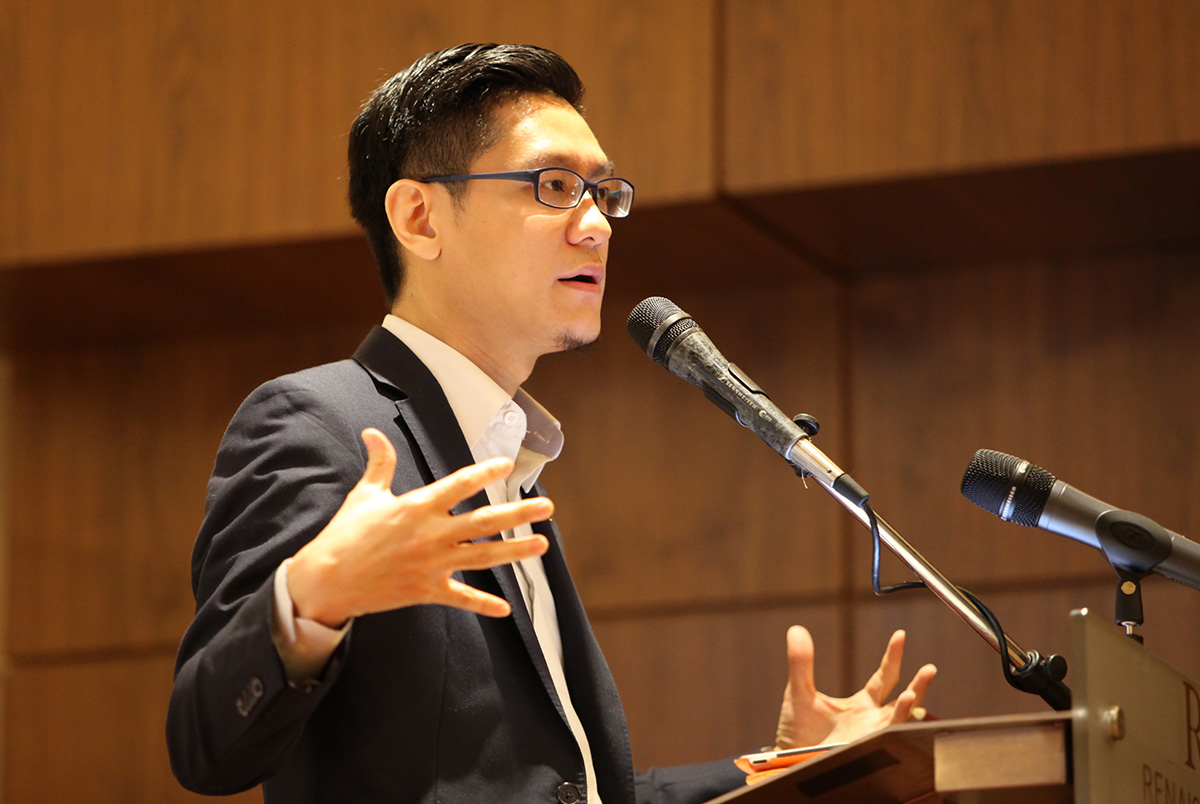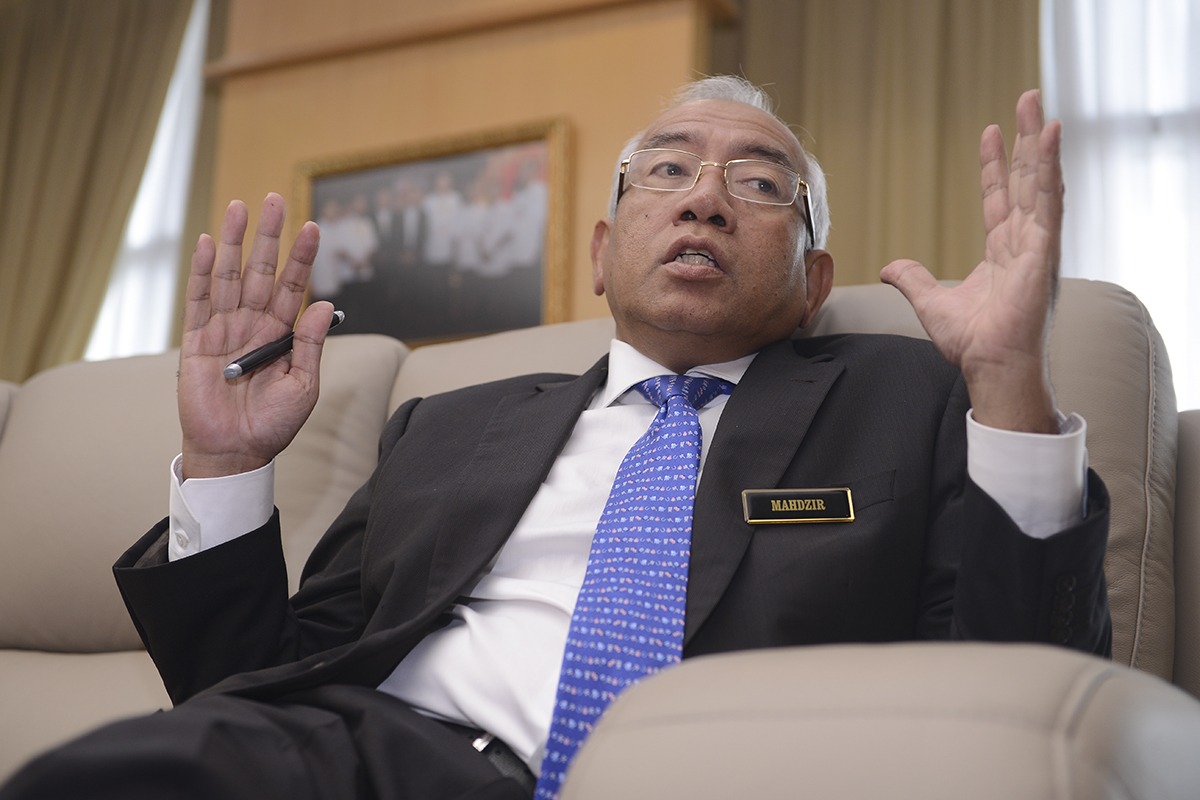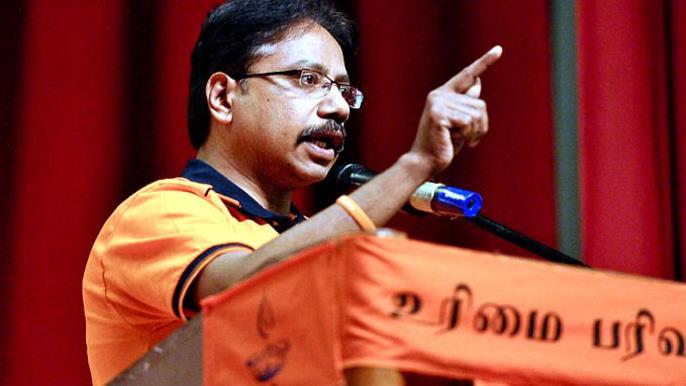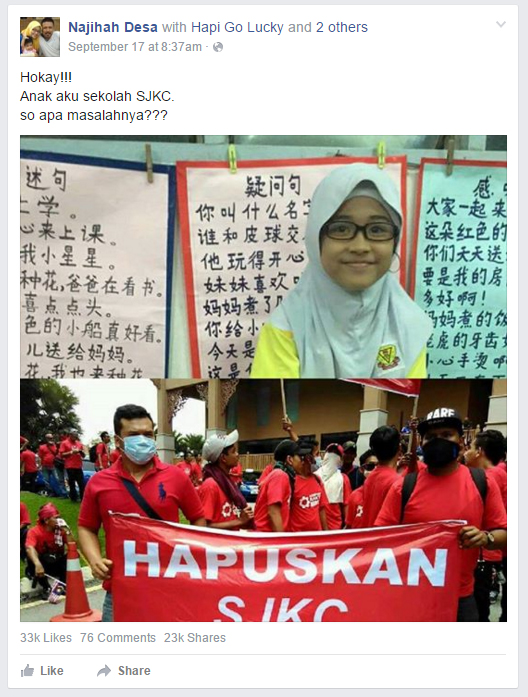Will Abolishing Vernacular Schools Put An End To Racism Among Malaysians?
Abolishing vernacular schools: One of the many issues that the "reds" have brought up to save the Malays' dignity.
Criticisms about the Malaysian education system have always been in the limelight. This time around, the issue of abolishing vernacular schools have sprung up, sparking a revived debate among Malaysians on the topic.
The "reds" holding up a banner that reads: "Hapuskan SJKC" (Abolish Chinese Schools) during the Himpunan Rakyat Bersatu, or popularly known as the "red shirts" rally that was held during Malaysia Day.
Image via MalaysiakiniThis popularly discussed issue, made headlines again when the "red shirts" protesters carried banners that read, "Hapuskan SJKC" (abolish Chinese schools) during the racially charged rally that was held on Malaysia Day, 16 September.
Taking the lead in responding against the anti-Chinese schools banner, Barisan Nasional's coalition member, the Malaysian Chinese Association (MCA) have spoken for the nation's Chinese Schools, saying that they have produced some of Malaysia's most excellent students.
This, MCA's Youth central committee member Quek Tai Seong said, has nothing to do with Malay dignity, which the participants of the rally gathered to defend yesterday.
“Abolishing Chinese vernacular schools will not revive Malay dignity, it is illogical," he added.
Slamming the "reds" for wanting to abolish Chinese-medium schools, Quek cited Article 152 of the Federal Constitution that gives Malaysians the freedom to choose the type of schools they wish to attend
He said while he upholds Article 152 of the federal constitution, which states that Bahasa Malaysia is the national language, every Malaysian must have the choice of the type of school they want to learn at.
“In fact I think Malays actually lose their pride if they abolish Chinese vernacular schools.
“Where have the open-hearted Malays who allowed the schools before gone to?” he asked in a statement.
The current Malaysian education system is based on the Razak Report, that was tabled in 1956, leading up to the independence of Malaya in 1957
Tun Abdul Razak Hussein was also the second prime minister of Malaysia and is the father of current prime minister Datuk Seri Naijb Razak and famous banker, Nazir Razak.
Image via Straits TimesThe Razak Report, named after the then Education minister, Tun Abdul Razak, which was eventually incorporated into Section 3 of the Education Ordinance of 1957, allows the retention of Chinese and Tamil medium schools while introducing Bahasa Malaysia as the medium of instruction in national schools.
While the term 'national school' is used to describe all the Malay-medium schools in the country, 'national-type school' is the term coined for both Chinese and Tamil schools.
The "reds" have since garnered support to abolish vernacular schools from certain members of the political community that blame the vernacular schools for racial disharmony
Abolishing vernacular schools will help reduce inter-ethnic tension in the country, Perak mufti Tan Sri Harussani Zakaria said amid controversy over "red shirt" rally goers purportedly calling for Chinese schools to be shut down.
Malay-language daily Sinar Harian reported Harussani as saying that he had already suggested to Prime Minister Datuk Seri Najib Razak and several ministers that Tamil and Chinese schools be closed down.
Harussani went on to justify his support for the closure of vernacular schools by saying that a single-system school would help the non-Malays learn Bahasa Malaysia
He added that Singapore's decision to abolish Malay and Chinese schools had strengthened the unity of its people.
"In Singapore there is only one school (system), which is English. There is no difference among them, they all think alike and that's why they respect each other.
"But you can see that the Malays there are sidelined when they apply for jobs. Usually they hire people with higher qualifications, and that's usually the Chinese."
He also questioned the government's reason for trying to appease the other races in the country.
Agreeing with Harussani, Deputy Prime Minister Datuk Seri Ahmad Zahid Hamidi also thinks that getting rid of vernacular schools will help foster racial unity among Malaysians
Malaysia can achieve racial harmony if the country adopts a single-stream “national” education system and puts an end to vernacular schools, newly-appointed deputy prime minister Datuk Seri Ahmad Zahid Hamidi told an interview with Berita Harian.
“How can a country have three different systems based on race and religion with no meeting point. We must have national education that crosses the barriers of race, religion and ethnicity,” Zahid was quoted by the Malay-language daily.
He added that while racial unity was already implicitly and explicitly taught in public schools, it was still important to have an education system that reflects that same unity.
On the contrary, Malaysian education groups think it is unconstitutional to close down the vernacular schools
“If you start forcing parents to send their children to national schools, I think there’s going to be a civil war. It has to be natural, voluntary,” said Datin Noor Azimah Abdul Rahim, chairman of Parent Action Group for Education (PAGE).
She said that vernacular schools were protected by the Education Act 1996 and, based on different interpretations, the Federal Constitution itself.
Shamsudin Hamid, the coordinator of the Association of Parents and Individuals towards Revising the Education System (ASPIRES), echoed her opinion.
“Their existence is allowed in the constitution. So if you shut it down, immediately, and in the current political climate, all hell will break loose.”
Act 550, Education Act 1996 allows the existence of 'national-type' schools. The Chinese and Tamil medium schools are allowed to use their respective mother tongues as a mode of communication, provided that English and Bahasa Malaysia are compulsory subjects.
Rubbishing the talks of abolishing vernacular schools to promote unity, DAP vice-chairman M Kula Segaran, instead, blames the Malaysian political system for racial issues heating up in Malaysia
He said it was quite hypocritical to speak about one stream school for all ethnic groups and at the same time have ethic based political structure and system.
“Ethno centric political system will reinforce the segmentation of ethnic communities into ethno centric schools,” said Kula, pointing out that Umno, MCA, and MIC ethnic-oriented politics was reflected in the national and vernacular schools.
He said the education ministry should first deal with the Islamic orientation of national schools and declining standards, as parents would desire the best education for their children.
It was the duty of the federal government to convince parents that mother-tongue education was here to stay and that the character of national schools would reflect Malaysia’s multi-ethnic nature, and that the standards of education would be enhanced.
"People say vernacular schools should be abolished because they are not multiracial. But Chinese schools are becoming even more multiracial than national schools now."
Zairil Khir Johari leads DAP's debates on national education policies in Dewan Rakyat.
Image via The Malaysian InsiderDAP MP Zairil Khir Johari, while shedding light on why shutting down vernacular schools would be a bad idea, said that demographics play a major role in how multi-racial the students of a national school are.
“In Kelantan, for example, the average number of non-Chinese pupils in Chinese schools is at 28%.”
He also argued that forcing all parents to send their children to just one type of school would not necessarily expose them to other races. This was because many national schools would still be dominated by one ethnic community, because of demographics, he said.
“Let’s say you have a national school in a predominantly Malay area. Even if there were no vernacular schools in the country, the students in that particularly school would all still be Malays,” said Zairil.
Meanwhile, the Education Ministry announced on 28 August, that a new module named, "Bina Bangsa" aimed to promote racial unity in vernacular schools, will be implemented in 2016, starting with schools in Klang Valley
The Education Ministry is drawing up a module to conduct "Bina Bangsa" or nation-building programmes for vernacular primary schools to address the lack of interaction between races among school children.
"It is hard to attract them to study at national schools because there are vernacular schools available. We have allowed an education system with three streams since Merdeka 58 years ago," said Education Minister Datuk Seri Mahdzir Khalid.
"Because of that, we want to let them meet over their six years in primary school, through leadership, cultural, sports and other programmes.
"Leadership programmes for the children, for example, can have the pupils from different types of schools all going to the seaside for the events. They will learn how to respect each other's faiths and cultures.
"At least when an ustaz takes his pupils to 'solat' (pray), the non-Muslim children will know what it means and respect their Muslim peers' practices," he said.
Refuting Mahdzir's claims about vernacular schools having problems with diversity, DAP MP Zairil, provided statistics from the Malaysian Education Blueprint (MEB) that reflects on how Chinese-medium schools are more multi-racial than national schools
The DAP Parliamentary Spokesperson for Education, Science and Technology pointed out that according to the Malaysia Education Blueprint (MEB), Bumiputera students now make up 94 per cent of enrollment in national primary schools- meaning that non-Bumiputera enrolment in national schools has dropped to only 6 per cent.
In contrast, the MEB also showed a 12 per cent increase in non-Chinese enrolment in Chinese vernacular schools.
“This effectively means that Chinese schools are more multiracial compared to national schools.
“In fact, there are Chinese schools with very significant numbers of non-Chinese enrolment. To give one example, SJKC Tiong Hua Kok Bin in Klang has about 45 per cent non-Chinese students,” Zairil explained.
In a turn of events, MIC Youth leader C Sivarraajh, broke the silence on behalf of MIC on the vernacular schools debate by describing the arguments against race-based schools as a "sacrilege"
Vernacular schools are part of the historical diversity of the history of our education system and they have been nurtured by descendants of immigrants who have now become equal citizens of the country.
To argue that for some reason the existing system is standing against national unity is simply sacrilege.
Political parties should always refrain from taking the easy way out and exploit racial and racial issues for political gain.
These are only short term gains but imagine the long term damage to the nation. Can we build nationhood on the basis of such politically divisive political statements that anger a particular community?
In the midst of arguments about abolishing vernacular schools, Hindraf Makkal Sakthi has urged the government to grant 'national school' status to vernacular schools
Hindraf Makkal Sakthi wants Tamil and Chinese schools, considered vernacular schools, to be upgraded to have national school status.
Hindraf Makkal Sakthi Chairman P. Waythamoorthy was stressing that “the pre-Merdeka negotiations had agreed for the maintenance of all vernacular schools in the country.”
A national school, by definition is one which is open to all ethnic groups while vernacular schools are generally attended by one ethnic group. Many vernacular schools, at the moment, are considered national-type – eligible for government aid — and not national schools.
“Malay schools were also vernacular schools at one time but became national schools after Bahasa Malaysia became the medium of instruction in English schools after Merdeka," he added.
Following all the debacle about the pros and cons of vernacular schools, a Malay family has slammed the "reds" for wanting Chinese schools to be closed
On 21 September, Najihah posted a photo of her daughter, Husna in her school's classroom along with a photo of the "red shirts" rally protesters holding a banner that says: "Hapuskan SJKC" (Abolish Chinese schools)
Image via Najihah Desa/Facebook/The Malaysian InsiderIn Facebook, Najihah Desa posted a picture of rally goers holding up banners calling for the abolishment of Chinese schools and another of her daughter in her classroom, with the caption: “Hokay!!! Anak aku sekolah SJKC. so apa masalahnya???” (My children go to Chinese school. So what is the problem?)
Many who commented, including other Muslims, who said they also sent their children to vernacular schools, praised Najihah for making a stand and slammed the actions of "red shirt” rally goers who were against such schools.
Najihah and her husband are from Taman Desa Jaya, Guar Chempedak. Their daughters Husna, 11, and Hannan, 7, attend SJK (C) Chung Hwa in Sungai Yan.
“Knowing more than one language is an advantage and this will bring about closer harmony with the other races. My children have friends of all races and my husband is a businessman who constantly deals with his Chinese counterparts,” she told The Star.
As we struggle with the process of creating an education system that works effectively for Malaysians, here are some things we can take into consideration as we go through the process of reformation:



